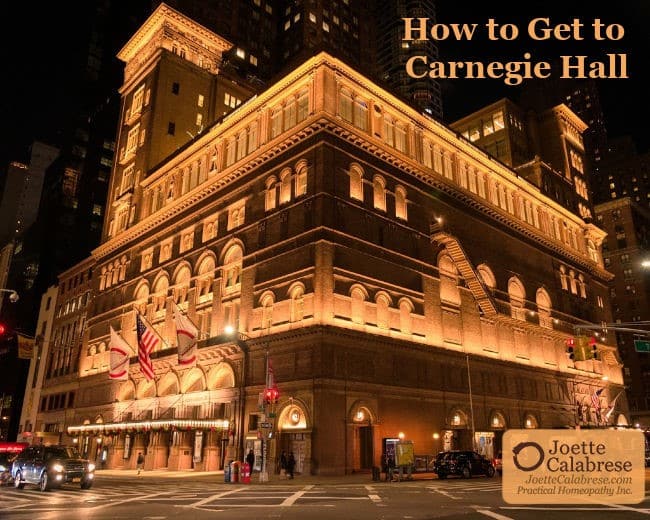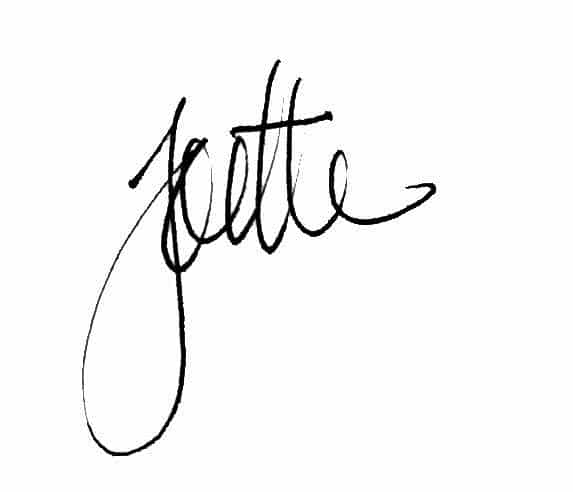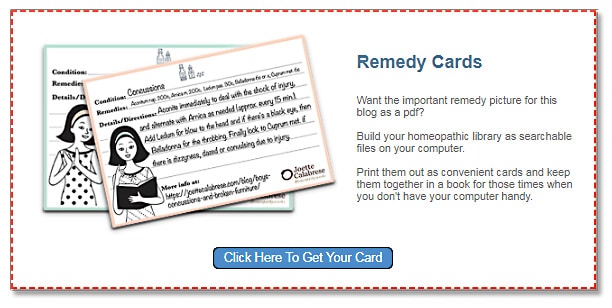
You’ve heard the old joke, “How do you get to Carnegie Hall?”
“Practice.”
Well, homeopathy requires practice — and patience — as well.
Have you ever wanted to be a fly on the wall as I begin to manage a case? Well, here’s your chance to eavesdrop on two conversations I have more often than I would like:
The new client begins with, “I used the medicine, but it didn’t work.”
“How long did you use it for?”
“I used it for two weeks, and it didn’t do anything!”
“Gee whiz. A WHOLE two weeks?”
Or …
“I used it for eight weeks, and nothing happened.”
“There was no improvement at all?”
“Wellllll, there was some improvement, but it didn’t cure it!”
Ladies and Gentlemen, that is case management: managing not only the condition and the medicines but also managing expectations and resolve.
Although I don’t take cases during the live conversations I have with my Gateway to Homeopathy Study Group members, I do try to impart my experience in case management.
My message as I talk to each study group? Don’t be too impatient!
You have to have patience. Some conditions may take many months to address successfully —psoriasis for instance. Sometimes a long-standing condition that has been suppressed by conventional, synthetic drugs will not uproot overnight. Then again, sometimes these factors don’t influence the speed of the outcome.
But while we don’t know how long it will take, we do know how to observe! This is how you learn case management.
I discussed case management a bit in my recent Podcast 98 – How to Take Your Own Case: Prioritize!
We need to compile an accurate backstory — the history of the condition and the details of how it manifests. We must know where we have come from in order to gauge how we progress accurately.
If there has been incremental improvement in a condition over time, we will most likely choose to continue on the same path for a longer time.
If there truly has been ZERO improvement after giving the homeopathic medicine an appropriate amount of time to work, then we may change course by re-assessing the symptoms and choosing an entirely different remedy. Often new symptoms present, or old ones become more noteworthy.
THIS is what I teach in my courses.
I give you everything I possibly can for free, and many times that information is enough to become proficient in the conditions most affecting your family.
I also try to teach you the central tenets for using homeopathy (watch my Facebook Live event 5 Things You Need to Know to Cure Yourself and Your Family).
However, more complex chronic conditions require a lengthier and more comprehensive format — the courses — for us to delve into the intricate methodology of case management.
It’s frustrating when I see people try to take shortcuts. Instead of studying, they simply ask, “What is the remedy for…?”
Then they try another person’s suggestion — a suggestion made independently from detailed knowledge of the case. When it doesn’t work, they may blame homeopathy instead of blaming their lack of understanding of what needs to be considered.
Other people buy a therapeutic index (a list of conditions and medicines commonly used), and they think that’s all they need! They’re done!
The other night, in a class of my Gateway to Homeopathy Study Group, a participant wanted to know if I knew of a therapeutic index. I suggested she use my blog, and she reasoned she didn’t find it as useful for what she was looking for because she didn’t want to read the story around the condition and remedy choice.
Yet what is often most important is the story around a remedy choice. This is what we call “the case.” Without at least a little background, it’s too easy to jump to conclusions. In each “story” I present on my blog, I offer clues and ideas I aim to emphasize that if disregarded, could result in a shallow remedy choice.
Here’s another example:
The Banerji Protocol book is a therapeutic index. How many people do you know who have actually read the entire book? Not many. Most people simply look up their condition and take the remedies with no clue of how it is to be administered, when to stop, etc. They don’t have the detailed background the Banerjis lay out in the rest of the book.
“Oh, I think I have colitis. Lemme look here in the index … ah yes, these are the homeopathic medicines that I should take.”
BAM! And they’re done.
They don’t take detailed notes of their exact symptoms to measure improvement. For example, they don’t factor in other medications they may be taking that could be causing a false diagnosis. They miss the undergirding of their condition entirely.
They’re making an end-run rather than managing their case — and calling it homeopathy!
Believe me, unless they get extremely lucky, they’re going to give up.
It’s not unlike learning the piano. Sure, you can hunt and peck around a keyboard to possibly play “Heart and Soul.” But to really learn how to play the piano you have to do your homework. You have to practice your scales with your right hand and then your left. Only then can you begin to attempt arpeggios!
You don’t get to Carnegie Hall without practicing every day for 30 years!
But that doesn’t mean you can’t be productive as you learn.
Some people learn a few chords and can play the piano recreationally while they continue their lessons.
In much the same way, you can learn a tremendous amount from my free blogs and podcasts. You can resolve acute conditions in your family — and even some of the less complicated chronic ones. Just as one example, osteoarthritis is often successfully addressed in some joints with the Banerji Protocol of Symphytum 200 mixed with Rhus tox 30, twice daily until very much better.
You can still do good work! Just remember to continue to DO YOUR HOMEWORK!
And pass on the good news of homeopathy!
Warmly,

P.S. To begin your education in homeopathy — or to brush up on the basics — I urge you to join a Gateway to Homeopathy study group. By following my ready-to-use curriculum, students from beginner to expert can join in or lead their own groups. Learning with others is the most efficient, enjoyable way to learn! It’s the exact way I learned homeopathy myself.
If you are ready to delve into the more complex topics — utilizing case examples — then it’s time to look at a course. I recommend using my Course Selector to determine which of my courses most fits with your family’s needs.
If money is tight right now, then continue with my blog, podcasts and Facebook Live events. While you won’t get the deep dive into topics my courses provide, you will be developing a strong background in homeopathy, preparing you to study at a deeper level when times change.
Just do your homework. Don’t stop learning! You will never regret the time you put into mastering homeopathy.







This was an excellent article, and just what I needed as a reminder to do my due diligence. Sometimes I print your whole blog because I want the context around the protocols. They are super helpful!
I have a question: if you’re taking a remedy (say ant crud 200 2W) for a chronic condition, but you had been taking a remedy (say ant crud 6 2D) for a different acute/chronic condition, do you indeed take both potencies of this same remedy on the different schedules? Thank you for all you do!
In some circumstances, it might be valid to do so but in general, it’s not a good idea. Its always better to choose one potency and allow it to fully act before deciding to break a general rule. Overkill is not a good plan when using homeopathy.
Perfect! Thank you!
Joette, thank you for ALL of your information that you share so freely. Thank you for making me aware of mistakes I may be making.
Because of your blogs, podcasts and emails I had no anxiety when this virus was predicted to become a pandemic, because this wonderful medicine of Homeopathy covers every base.
I was a client in 2015, having trouble with my thyroid. I want to say that because of your remedy recommendations, I got my life back and actually have energy to live life to the fullest. I have taken your Gateway Courses and Feminopathy. Hopefully I will be able to take some more courses in the near future.
I now have family members and friends believing in Homeopathy because it worked for them!
I remember you Rebecca and it makes my heart sing that you are here to relay that you were helped by working with homeopathy and me.
It’s true. No worries when you have a medicine you can count on.
Keep up the good work.
You recommend Rhus Tox 1M for Arthritis in one of your blogs. You also recommended Symphtum 200 mixed with Rhus Tox 30 for osteoarthritis. I have osteoarthritis. Which would you try first and How many Rhus Tox 1 M do you take if that protocol is chosen. Thank you.